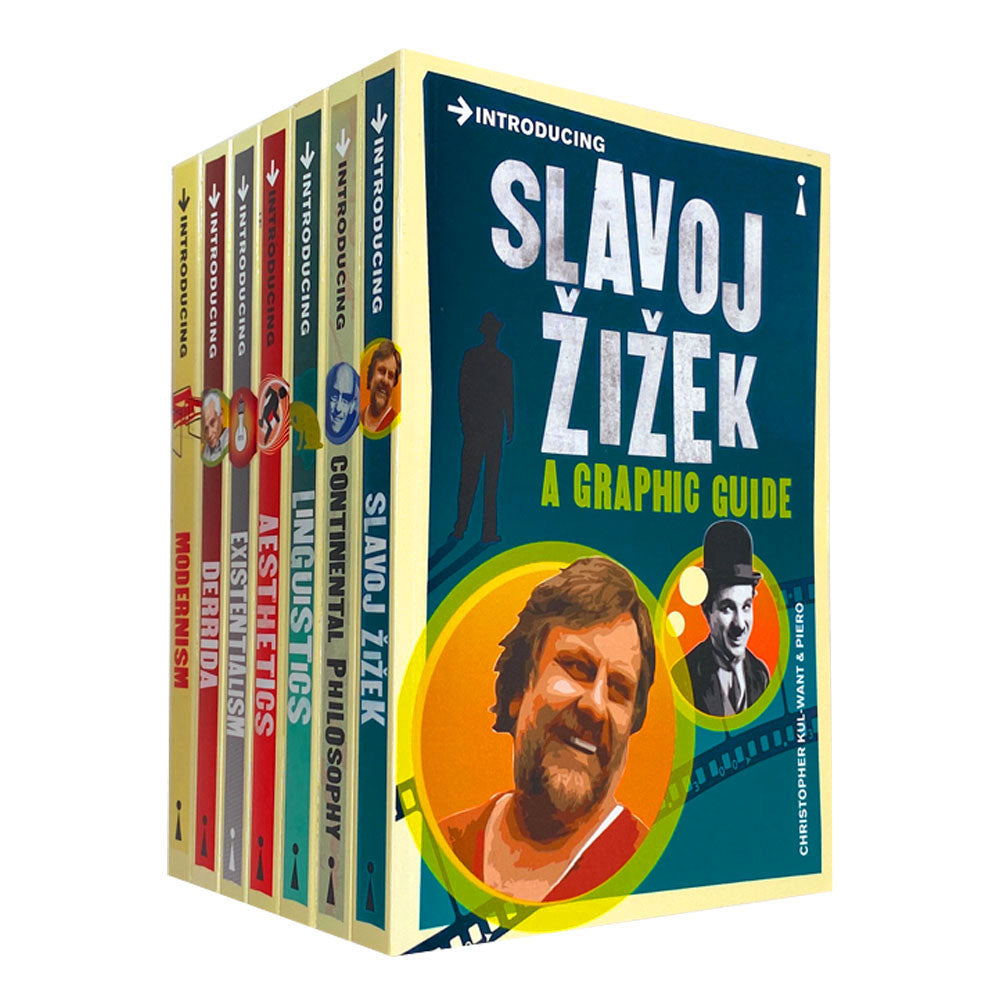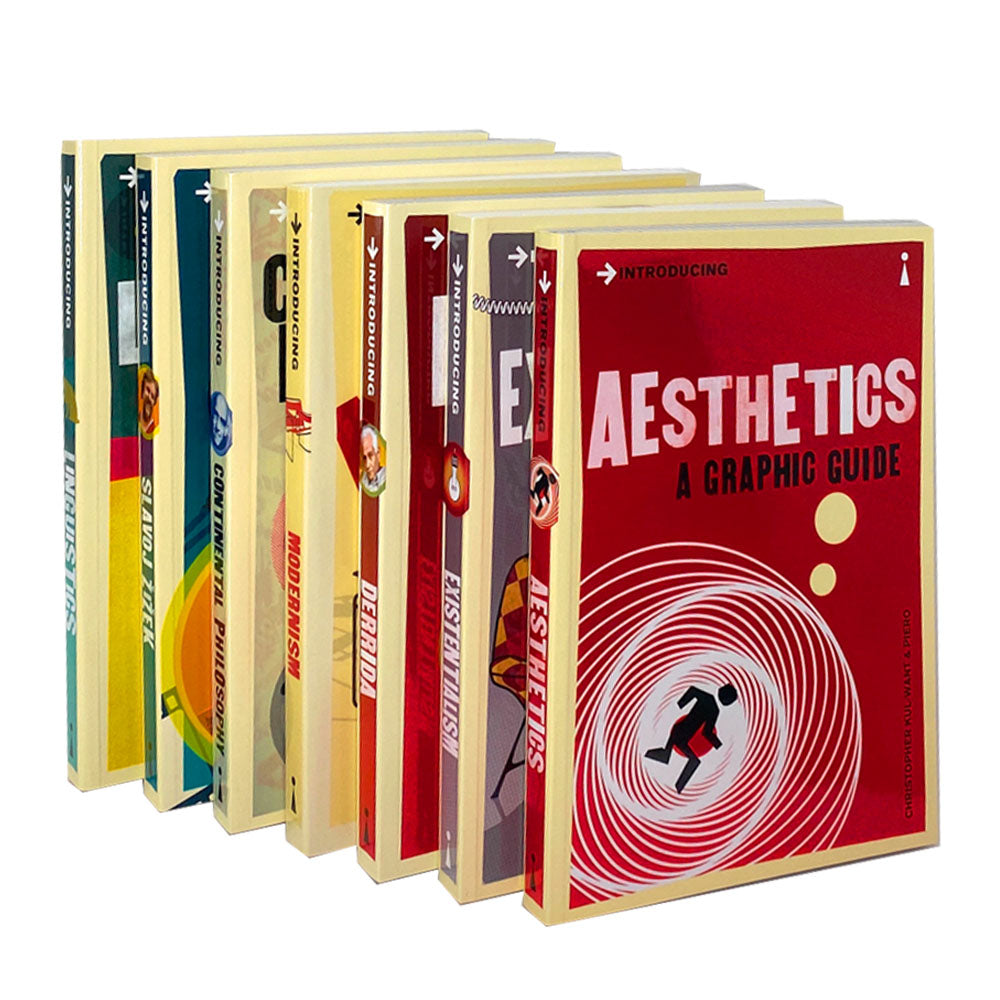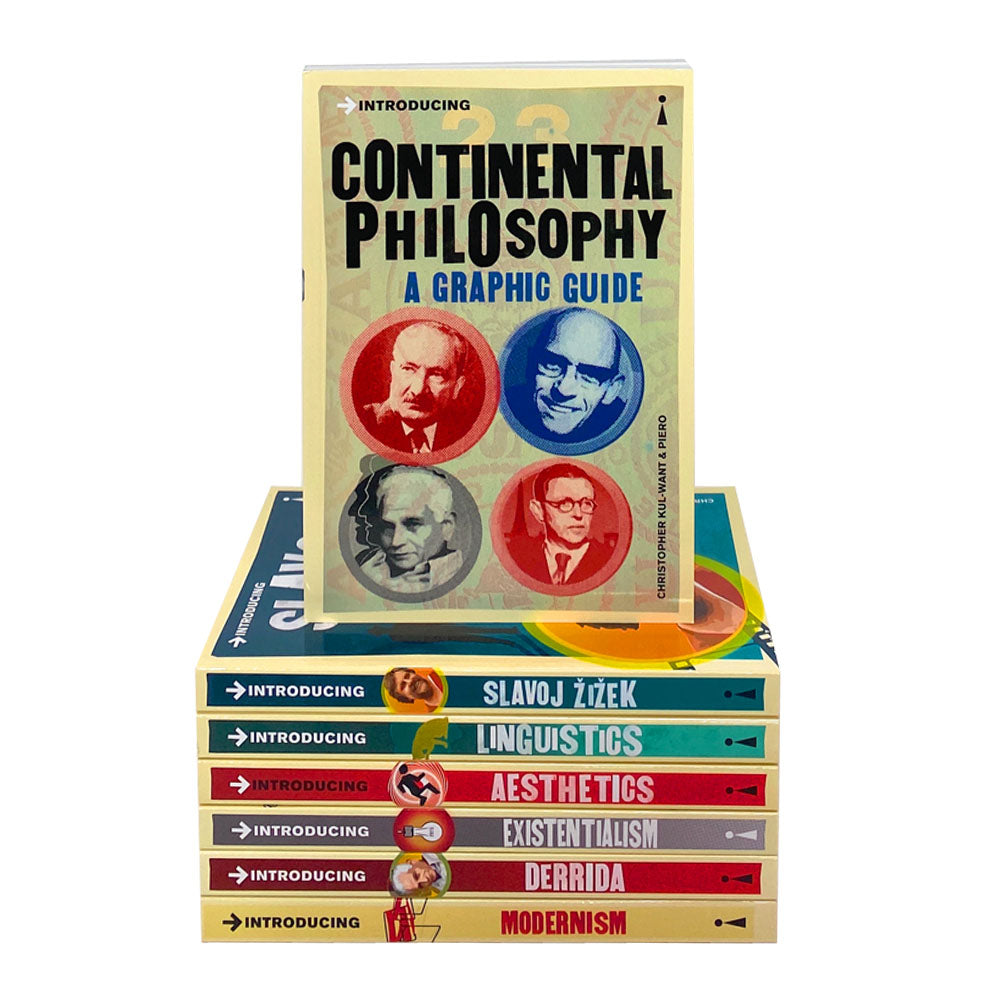





A Graphic Guide Introducing Series 5 Collection 8 Books Set
Get 5% OFF Your First Order🏷️ Use Code At Checkout: Miina5
🏷️ More Deals!
6% off 2+ products! Use code at checkout: 6Off
8% off 3+ products! Use code at checkout: 8Off
10% off 4+ products! Use code at checkout: 10Off
Barcode: 9789526536491
Description
Titles in this set:
Cultural Studies
Slavoj Zizek
Modernism
Derrida
Existentialism
Aesthetics
Linguistics
Continental Philosophy
Description
Cultural Studies
Cultural Studies signals a major academic revolution for the 21st century. But what exactly is it, and how is it applied? It is a discipline that claims not to be a discipline; it is a radical critical approach for understanding racial, national, social and gender identities. "Introducing Cultural Studies" provides an incisive tour through the minefield of this complex subject, charting its origins in Britain and its migration to the USA, Canada, France, Australia and South Asia, examining the ideas of its leading exponents and providing a flavour of its use around the world. Covering the ground from Gramsci to Raymond Williams, postcolonial discourse to the politics of diaspora, feminism to queer theory, technoculture and the media to globalization, it serves as an insightful guide to the essential concepts of this fascinating area of study. It is essential reading for all those concerned with the quickening pulse of old, new and emerging cultures.
Slavoj Zizek
Charting his meteoric rise in popularity, Christopher Kul-Want and Piero explore Zizek's timely analyses of today's global crises concerning ecology, mounting poverty, war, civil unrest and revolution. Covering topics from philosophy and ethics, politics and ideology, religion and art, to literature, cinema, corporate marketing, quantum physics and virtual reality, Introducing Slavoj Zizek deftly explains Zizek's virtuoso ability to transform apparently outworn ideologies – Communism, Marxism and psychoanalysis – into a new theory of freedom and enjoyment.
Modernism
Modernism is usually thought of as a shock wave of innovations hitting art, architecture, music, cinema and literature - the work of Picasso, Joyce, Schoenberg, movements like Futurism and Dada, the architecture of Le Corbusier, T.S. Eliot's The Wasteland and the avant-garde theatre of Bertolt Brecht or Samuel Beckett. But what really defines modernism? Why did it begin and how long did it last? Is Modernism over now? Chris Rodriguez and Chris Garratt's brilliant graphic guide is a brilliant exploration of the last century's most thrilling artistic work - and what it's really all about.
Derrida
Brilliant illustrated guide to the best-known and most controversial continental philosopher of the latter 20th century. Jacques Derrida is the most famous philosopher of the late 20th century. Yet Derrida has undermined the rules of philosophy, rejected its methods, broken its procedures and contaminated it with literary styles of writing. Derrida's philosophy is a puzzling array of oblique, deviant and yet rigorous tactics for destabilizing texts, meanings and identities. 'Deconstruction', as these strategies have been called, is reviled and celebrated in equal measure. Introducing Derrida introduces and explains his work, taking us on an intellectual adventure that disturbs some of our most comfortable habits of thought.
Existentialism
Richard Appignanesi goes on a personal quest of Existentialism in its original state. He begins with Camus' question of suicide: 'Must life have a meaning to be lived?' Is absurdity at the heart of Existentialism? Or is Sartre right: is Existentialism 'the least scandalous, most technically austere' of all teachings? This brilliant Graphic Guide explores Existentialism in a unique comic book-style.
Aesthetics
What is beauty, and what is truth? These are some of the questions which aesthetics tries to answer. In our everyday life, we talk about the 'aesthetics' of an artwork or a piece of design. But aesthetics goes beyond the simple experience of art. It is also a branch of philosophy concerned with the whole nature of experience itself, explored through our perceptions, feelings and emotions.
Linguistics
Covering thinkers from Aristotle to Saussure and Chomsky, "Introducing Linguistics" reveals the rules and beauty that underlie language, our most human skill.
Continental Philosophy
What makes philosophy on the continent of Europe so different and exciting? And why does it have such a reputation for being 'difficult'? Continental philosophy was initiated amid the revolutionary ferment of the 18th century, philosophers such as Kant and Hegel confronting the extremism of the time with theories that challenged the very formation of individual and social consciousness. Covering the great philosophers of the modern and postmodern eras – from Nietzsche, Heidegger, Derrida and Deleuze right to up Agamben and Žižek – and philosophical movements from German idealism to deconstruction and feminism – Christopher Kul-Want and Piero brilliantly elucidate some of the most thrilling and powerful ideas ever to have been discussed.
A Graphic Guide Introducing Series 5 Collection 8 Books Set
Book Information
Complete details about this book
AUTHOR
Various AuthorsPUBLISHER
Icon Books
Turn Curiosity Into Discovery
Discover a world of books at Miina Books from gripping fiction and insightful non-fiction to educational titles and wellness guides. Whether you're reading for pleasure, learning, or growth, we have something for every reader. Explore stories, spark ideas, and find inspiration on every shelf.
- Related products
- Recently viewed



